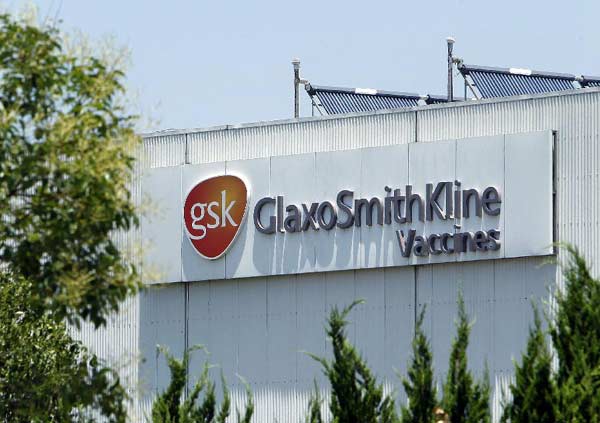

Photo taken on July 12, 2013 shows the building of a vaccines company of GlaxoSmithKline (GSK), Britain's biggest drug maker, in Shanghai, east China. Some senior executives from GlaxoSmithKline(China) Investment Co., Ltd are being investigated for suspected bribery and tax-related violations, Chinese police said Thursday. (Xinhua/Ding Ting)
Four senior executives from multinational pharmaceutical company GlaxoSmithKline (GSK) are being held by Chinese police on suspicion of having committed serious economic crimes, Xinhua has learned.
The executives of GSK (China) Investment Co., Ltd., identified by their Chinese names, include vice president and operation manager Liang Hong, vice president and human resources director Zhang Guowei, legal affairs director Zhao Hongyan, and business development manager Huang Hong, according to the investigation team.
The four were once dubbed the GSK China's "quadriga."
In an interview with Xinhua, Liang, who supervises about 3,000 medical representatives across China to deal with hospitals and doctors, admitted that he had been "in contact with" senior government officials and medical experts.
He said he was authorized to approve an annual budget up to hundreds of millions of yuan.
The Ministry of Public Security announced last week that some senior executives from GSK China were being investigated for suspected bribery and tax-related violations.
The suspects are believed to have offered large bribes to government officials, medical industry associations and foundations, hospitals and doctors in order to expand the company's market in China and raise the price of its medicine.
Most of the bribes are thought to have been given through travel agencies.
The police have also held and questioned the corporate representative of a travel agency suspected of being involved in the case, according to the investigation team.
GSK issued a statement regarding the ongoing investigation by Chinese authorities on its Chinese website Monday, saying it "shares the desire of the Chinese authorities to root out corruption."
"We will cooperate fully with the Chinese authorities in the investigation of these new allegations," it said.
The statement said GSK is "reviewing all third party agency relationships" and has "put an immediate stop on the use of travel agencies that have been identified so far in this investigation." It is also "conducting a thorough review of all historic transactions related to travel agency use."
DEALS FOR BRIBERY
The investigation team said the case was not uncovered by any "insider whistleblower" but just came to light in a police investigation.
During the first half of this year, police found abnormalities with the operation of the Shanghai Linjiang International Travel Agency.
"It was only keeping contact with some pharmaceutical enterprises and hardly doing ordinary tourism business. However, its annual turnover has surprisingly surged from several million yuan at its start-up period in 2006 to about a hundred times the figure at present," a police officer from the investigation team told Xinhua.
A later probe indicated that GSK China and some of its affiliated enterprises were implicated and are prime suspects in the violations.
Weng Jianyong, corporate representative of the Linjiang Travel Agency, told Xinhua that he had a tacit agreement with GSK's Liang that Liang would offer him conference service business opportunities, and some of the payment to his agency would be given to Liang as kickbacks.
Between 2010 and this year, the bills for such "patronized business" have totaled 30 million yuan (4.87 million U.S. dollars) and the "due" kickback for Liang was about 2 million yuan.
Liang took some of the money and the rest was left to Weng to cover Liang's "non-reimbursable expenses."
Weng confessed that Liang had told him clearly that such "non-reimbursable expenses" are generally used as bribes to officials and experts.
"Sometimes, Liang tells me his bribery purposes over the phone and I prepare the money and deliver to the relevant person," he said.
Weng was also doing business with other GSK departments and the kickbacks his agency had given to GSK China's senior managers since 2009 allegedly totaled about 20 million yuan, part of which had been used for the company's bribery.
As GSK has strict internal financial regulations regarding expenses for business receptions and gifts -- no more than 300 yuan for each person -- it is thought that the travel agency and the managers usually used fraudulent reports and falsely-issued invoices to con the company out of the money.
The travel agency had also obtained a huge amount of money in the form of business revenues, according to Weng.
He said to his knowledge his agency is not the only one having similar deals with GSK.
Some travel agencies had reportedly offered "sex bribes" to GSK senior executives to maintain business contact.
SURGING MEDICINE PRICES
Medicine prices are regulated by the government in China and patients rarely have a say in medical pricing.
"If we want to sell a medicine in China, we should handle the procedures with the drug administration, price regulator, social security authority, local governments as well as hospitals and doctors, and all these procedures may give rise to corruption risks," according to Liang.
The costs for the large bribes will eventually be transferred to patients through higher medicine prices, Liang said, adding that it is estimated that such extra costs may account for up to 30 percent of medicine prices.
A medicine that cost only 30 yuan to produce could end up setting patients back 300 yuan, he said.
A statement from the Public Security Ministry has pledged serious investigation of the case to deter similar bribery in commercial fields.
All relevant government authorities will also work together in regulating the medical industry to curb inflated medicine prices and benefit the public, it said.
Four senior GSK executives detained
2013-07-16Police say GSK broke law to boost sales
2013-07-15Four GSK China execs held for investigation
2013-07-15GSK to cooperate with China in bribery inquiry
2013-07-12Pharma giant GSK investigated for bribery
2013-07-12Copyright ©1999-2018
Chinanews.com. All rights reserved.
Reproduction in whole or in part without permission is prohibited.